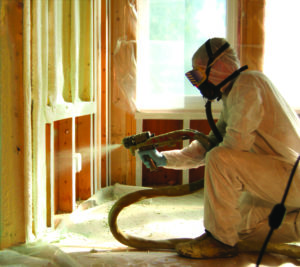Spray Foam Installation for Homes & Buildings in the Lowcountry Area

Contact our team today if you’re ready to start your project! Call (888) 907-3090 or contact us online.
What Is Spray Foam Insulation?
Spray foam insulation is an alternative to traditional fiberglass insulation. It is applied wet and quickly expands into a thick foam that fits snugly in wall cavities, crevices and gaps, making it ideal for insulating hard-to-reach areas and around piping and wiring.
Due to its expanding properties and versatile placement abilities, spray foam insulation is a favorite of commercial and residential buildings.
Benefits of Spray Foam Insulation
This type of insulation can help:
- Eliminate air leaks
- Reduce energy bills and maximize your home or building’s energy efficiency
- Make your home or building more comfortable year-round
- Reduce noises from both outside and inside, between different rooms and levels
- Improve the performance of your HVAC systems
- Contribute to a healthier environment
Spray foam insulation should be installed by a trained professional — someone who has been trained in the correct installation safety precautions and has the required equipment to mix and apply the product.
When installed properly, polyurethane spray foam insulation can help reduce energy costs and improve indoor air quality. Our team has the knowledge, experience and resources that few companies can match.
Think spray foam insulation may be right for you? Contact us online or call (888) 907-3090 to get your insulation project started today!
Spray Foam Insulation FAQs
What’s the R-value of spray foam?
The “R” in “R-value” stands for “resistance” and refers to the amount of temperature transference or heat flow. Higher R-values mean the area is well insulated. With spray foam insulation, R-values are already high but can vary according to the insulation’s properties:
- High-density: R-5.5 or more for 3 lbs./cu.ft. closed-cell foam (good for roofing/exterior) when greater strength is needed
- Medium-density: R-5.7 or more for 2 lbs./cu.ft. closed-cell foam (good for interior walls, unvented attics or continual insulation) when noise reduction or additional water barrier is needed
- Low density: R-3.6 or more for 0.5 lbs./cu.ft. open-cell foam (good for interior wall cavities, ceilings and unvented attics) when sound reduction or more air barrier is needed
Is spray foam insulation safe?
Once it’s applied and cured, yes: Spray foam insulation produces minimal off-gassing, and because it’s such a good insulator, it can improve the air quality inside your home. However, it’s important to remember spray foam insulation should only be installed by professionals. Any chemical substance is hazardous if not properly handled, which includes spray foam insulation. Leave it to the pros for maximum safety and effectiveness.
What is the difference between closed-cell and open-cell insulation?
- Open-cell foam: This type of insulation is full of cells that aren’t completely encapsulated. This makes the foam a softer, more flexible material.
- Closed-cell foam: This type of insulation is made up of cells that are entirely closed. Closed-cell spray foam is much more rigid and stable than open-cell foam.
Spray foam vs. fiberglass insulation?
- Spray foam: This type of insulation has a higher R-value, meaning it’s effective in resisting airflow. While spray foam is a little more expensive, it will pay off on energy bills in the long run.
- Fiberglass: Fiberglass is a cheaper option and is also great for attics.
Spray foam vs. rigid foam insulation?
- Spray foam: Spray foam is great for air sealing since the foam expands to fill gaps and cracks. This type of insulation also has a higher R-value.
- Rigid foam: This type of insulation is less messy and provides excellent air sealing. The installation process for rigid foam takes longer than spray foam insulation.
Spray foam vs. rockwool insulation?
- Spray foam: Spray foam insulation stays in place, meaning it won’t shift, settle, or fall out of place.
- Rockwool: This type of insulation is fire-resistant and water-repellant. It also has great thermal insulation properties.
IBP Charleston is your local insulation company that’s part of the Installed Business Products Family of Companies. This means we can provide the best materials at a lower cost.
For more information, call 843-885-1881 or contact IBP Charleston.
